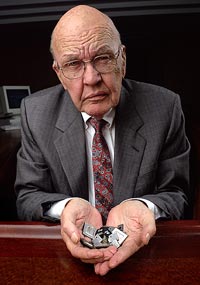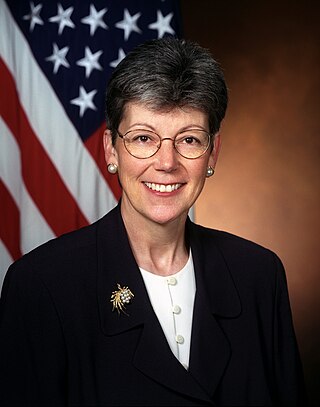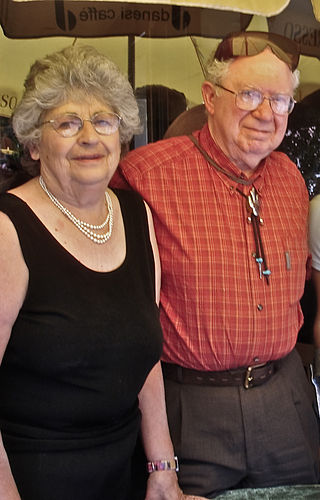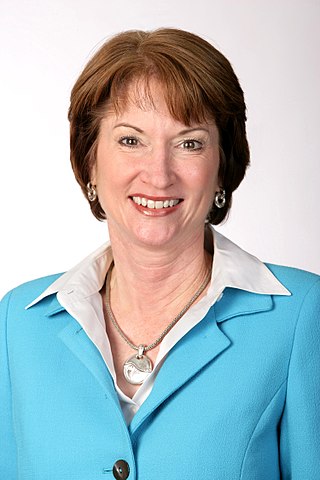
Electrical engineering is an engineering discipline concerned with the study, design, and application of equipment, devices, and systems which use electricity, electronics, and electromagnetism. It emerged as an identifiable occupation in the latter half of the 19th century after the commercialization of the electric telegraph, the telephone, and electrical power generation, distribution, and use.

Jack St. Clair Kilby was an American electrical engineer who took part, along with Robert Noyce of Fairchild Semiconductor, in the realization of the first integrated circuit while working at Texas Instruments (TI) in 1958. He was awarded the Nobel Prize in Physics on 10 December 2000.

Yale Nance Patt is an American professor of electrical and computer engineering at The University of Texas at Austin. He holds the Ernest Cockrell, Jr. Centennial Chair in Engineering. In 1965, Patt introduced the WOS module, the first complex logic gate implemented on a single piece of silicon. He is a fellow of both the Institute of Electrical and Electronics Engineers and the Association for Computing Machinery, and in 2014 he was elected to the National Academy of Engineering.

Ruth Teitelbaum was one of the first computer programmers in the world. Teitelbaum was one of the original programmers for the ENIAC computer.
Duy-Loan T. Le is an engineer and the first woman and Asian elected as a Texas Instruments Senior Fellow.

Richard K. Templeton, best known as Rich Templeton, is an American electrical engineer and business executive. He is currently the chairman and former chief executive officer of Texas Instruments.

Patrick Eugene Haggerty was an American engineer and businessman. He was a co-founder and former president and chairman of Texas Instruments, Incorporated (TI). Under his leadership, the company grew from a small Texas oil exploration company into a global leader in the semiconductor industry. During his tenure, TI invested in transistors when their commercial value was still much in question, created the first silicon transistor, the first commercial transistor radio, the first integrated circuit, and helped develop and produce the first single chip microprocessor.

Delores Maria Etter is a former United States Deputy Under Secretary of Defense for Science and Technology from 1998 to 2001 and former Assistant Secretary of the Navy for research, science, and technology from 2005 to 2007.

Thelma Estrin was an American computer scientist and engineer who did pioneering work in the fields of expert systems and biomedical engineering. Estrin was one of the first to apply computer technology to healthcare and medical research. In 1954, Estrin helped to design the Weizmann Automatic Computer, or WEIZAC, the first computer in Israel and the Middle East, a moment marked as an IEEE Milestone in Electrical and Computer Engineering. She was professor emerita in the Department of Computer Science, University of California at Los Angeles (UCLA).

Anita Katherine Jones is an American computer scientist and former U.S. government official. She was Director, Defense Research and Engineering from 1993 to 1997.
Geoffrey Charles Orsak is a native of Schenectady, New York who went to Houston and entered Rice University, where he earned BS, MS and Ph.D. degrees in electrical engineering. After earning his doctorate in 1989, He joined George Mason University to teach electrical engineering as an Assistant Professor. In 1997, he moved to Dallas, and joined the faculty at Southern Methodist University (SMU) as Associate Professor of Electrical and Computer Engineering. In March 2004, he was named Dean of the School of Engineering and Applied Science at SMU. In 2012, he accepted an offer to become the 18th president of the University of Tulsa in Tulsa, Oklahoma. However, he was abruptly terminated, with no public explanation, only 77 days later.

Lisa Tzwu-Fang Su is an American business executive and electrical engineer who is the president, chief executive officer and chair of AMD.

Peggy Johnson is most recently the former chief executive officer (CEO) of Magic Leap, succeeding Rony Abovitz in Sept 2020. Before joining Magic Leap, she held the position of Executive Vice President of Business Development at Microsoft. Johnson was replaced as CEO by Ross Rosenberg in November 2023.
Julie Spicer England is an American chemical engineer and business executive, who served as Vice President of Texas Instruments Incorporated.

Melendy Ewing Lovett is an American businesswoman, accountant, consultant, and advocate for women in STEM education and in the workforce. Lovett is the Senior Vice President and Chief Administrative Officer at Trinity Industries. She was formerly a Senior Vice President of Texas Instruments and the President of the company's worldwide Education Technology business, which focuses on market-leading educational technology to improve teaching and learning of math and science. She is now the chief administrative officer at Trinity Industries.
Rhonda Franklin is a professor of electrical and computer engineering at the University of Minnesota. She is a microwave and radio frequency engineer whose research focuses on microelectronic mechanical structures in radio and microwave applications. She has won several awards, including the 1998 NSF Presidential Early Career Award for Scientists and Engineers, the 2013 Sara Evans Leadership Award, the 2017 John Tate Award for Excellence in Undergraduate Advising, and the 2018 Minnesota African American Heritage Calendar Award for her contributions to higher education.
Santosh Kurinec is an IEEE fellow and a professor of Electrical & Microelectronic Engineering at Kate Gleason College of Engineering in Rochester Institute of Technology (RIT). She is an Indian American electronic engineer specializing in electronic materials and devices. She is a former IEEE Electron Devices Society distinguished lecturer. In 2018, she was inducted into the Women in Technology International (WITI) Hall of Fame.
Shaunna F. Sowell is an engineer who was Vice President and Manager of DFAB water fabrication facilities for Texas Instruments.

Karen Ann Panetta is an American computer engineer and inventor who is a professor and Dean of Graduate Education at Tufts University. Her research considers machine learning and automated systems. She is a Fellow of the Institute of Electrical and Electronics Engineers, the American Institute of Aeronautics and Astronautics and the National Academy of Inventors. She is a member of the National Academy of Engineering, and Fellow of the European Academy of Sciences and the Arts, and the Asia-Pacific Artificial Intelligence Association. She was the STEM Advisor to President Joyce Banda of Malawi and U.S. Ambassador to Slovenia, Linda Blanchard.











